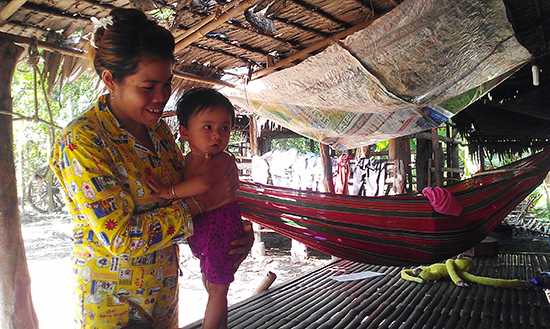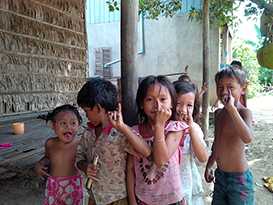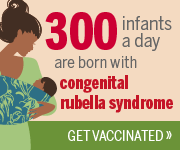Success in Cambodia: The Disappearance of Measles! (With Rubella Not Far Behind)

Measles is one of the most contagious diseases in the world. The measles vaccine is extremely effective, but eliminating the disease from a country is no easy feat. So it is easy to see why families in Cambodia are happy to see the measles gone. Photo courtesy of Nita Patel/CDC.
When something disappears, people tend to panic, except when what has gone missing is a dreaded disease like measles.
Cambodia hasn’t reported a single confirmed case of measles since November of 2011, while its neighbors continue to face outbreaks, illness and death from this vaccine-preventable disease. In 2013, Cambodia became the first low-income country in Asia to protect its children against rubella and congenital rubella syndrome!
Why has Cambodia been so successful?
- Measles vaccination: Since the early 2000s, Cambodia has placed a lot of focus and resources on conducting mass measles vaccination campaigns, which led to a dramatic drop in measles cases – zero confirmed cases since November of 2011.
Then national immunization program started providing a second dose of measles vaccine to all children at 18 months of age in May of 2012. Having two doses of a measles-containing vaccine provides high immunity against measles and this protection lasts a lifetime.
In July 2014, CDC immunization experts traveled to Cambodia to evaluate the introduction of the second measles dose into the routine immunization program. See photos from this activity here. -
Tracking measles and rubella: Over the past few years, Cambodian immunization staff integrated their rubella tracking into their measles detection system. This tracking system is sensitive enough to document the disappearance of measles and demonstrate the heavy burden of rubella.
DID YOU KNOW?
Rubella outbreaks, which occur every few years in Cambodia, can have long-lasting consequences for babies born with congenital rubella syndrome (CRS) such as blindness, deafness, heart disease and developmental delays. The World Health Organization (WHO) has estimated that, before introduction of rubella vaccine, up to 260 children were born with CRS every year in Cambodia, with the number of cases rising to 1400 during outbreaks.
Once Cambodia started tracking and reporting cases of rubella and congenital rubella syndrome, the immunization program was able to show that there was a significant burden of disease and successfully applied to the GAVI Alliance in 2013 for financial assistance to purchase the 2-in-1 measles-rubella vaccine. - Catch-up campaign: With support from GAVI and the Measles & Rubella Initiative, Cambodia conducted a nationwide mass vaccination campaign in November 2013 to protect against measles and rubella in children from 9 months up to 15 years of age.
CDC worked with Cambodian health officials to monitor the campaign, which aimed to protect over four million Cambodian children through vaccination. Health workers traveled to schools all over the country to administer the vaccines to students and set up fixed vaccination sites to reach children under five years of age and children not attending school. CDC’s experts and other national and international counterparts followed the campaign and checked that children were reached, especially those living in remote or underserved communities in rural and urban areas.
Advocacy efforts from the Cambodian Government engaged health partners, civil society, community leaders, health center staff and village health volunteers under the umbrella of leadership provided by the Ministry of Health. The involvement of groups from all sectors was essential in identifying and vaccinating infants and children in at risk communities who are at a higher risk for not being reached by routine immunization services.

Young children show off their purple pinkies to confirm that they have received the measles-rubella vaccine during the November 2013 campaign. Photo courtesy of Sue Chu/CDC.
What’s next?
We at CDC are looking forward to November of this year, which will mark three years without a measles case in the country, at which point verification of measles elimination will be conducted. Measles elimination is defined as the absence of continuous disease transmission for 12 months or more in a specific geographic area. In such areas, there may still be measles cases but they are from infected people who bring the disease into the area. CDC will participate in the process of verifying Cambodia as measles-free. This involves proving that the measles and rubella tracking system in the country is strong enough to detect any cases of measles that may be brought into Cambodia from abroad, as well as verifying the absence of measles cases for three years.
CDC’s measles and rubella team cannot wait to congratulate Cambodia on its success in eliminating measles! We hope that rubella control efforts will follow a similar path and eventually result in rubella elimination.
More about CDC and the Measles & Rubella Initiative
As a spearheading partner of the Measles & Rubella Initiative, CDC provides expertise to develop global and regional policies and strategies for measles elimination and rubella control/congenital rubella syndrome (CRS) prevention and rubella/CRS elimination, supports their implementation, supports laboratory work and disease tracking, and conducts evaluation. Learn more about our work to eliminate measles and rubella.
The Measles & Rubella Initiative
Founded in 2001, the Measles & Rubella Initiative is led by the American Red Cross, the United Nations Foundation, the United Nations Children’s Fund, the US CDC, and the World Health Organization. Since then, the Initiative has supported the delivery of more than 1.1 billion doses of measles-containing vaccine and helped raise measles vaccination coverage to 85% globally. As a result, worldwide measles deaths have been reduced by 78%. Measles vaccine has prevented an estimated 13.8 million deaths from 2000-2012. In 2012, the Initiative also began activities to prevent rubella and CRS worldwide. The Initiative aims to further reduce measles deaths by 95% by 2015, and eliminate measles in all six of the WHO regions by 2020. Four regions have goals for the control and elimination of rubella.
Related Links
- Page last reviewed: October 29, 2014
- Page last updated: October 29, 2014
- Content source:
Global Health
Notice: Linking to a non-federal site does not constitute an endorsement by HHS, CDC or any of its employees of the sponsors or the information and products presented on the site.



 ShareCompartir
ShareCompartir